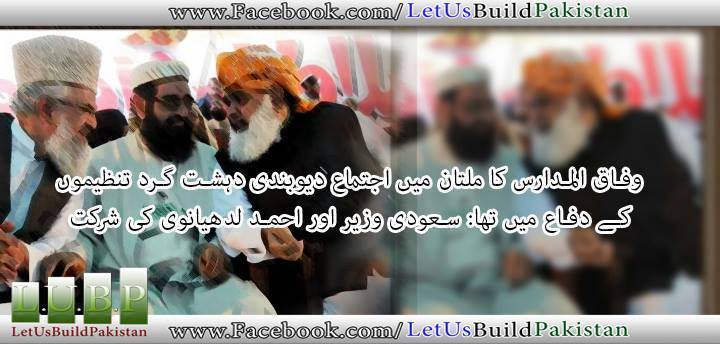Mai Yamani confused by false Shia Sunni binary but makes some good points: Saudi Arabia’s pilgrimage to Pakistan
Editor’s note: Mai Yamani’s own article denies her narrative. Mai Yamani reduces a geopolitical conflict to a false Shia Sunni binary and a Iran Saudi conflict. This note should not be taken as blanket criticism as Mai does make some good points about the desperation and isolation faced by the Saudi Salafi Monarchy.
By her own account, Saudi Salafis are isolated and feel threatened by the the Sunni Muslim Brotherhood of Egypt, who are Pan-Islamists and anti-monarchy. The Muslim Brotherhood shares the Pan or Political Islamic (anti-monarchy) ideology with the Pan-Islamic Shia Iran, which forms a natural Pan-Islamist alliance. By definition this is a Pan-Islamist Shia Sunni anti-monarchy alliance against the Saudi Salafi monarchy.
In the context of Pakistan, most of the Madrassas in Pakistan are funded by the Salafist of Saudi Arabia, these Madrassas are run by Deobandi clerics who preach violence based on the Haqqania Madrassa of Mullah Sandwich Sami ul Haq Deobandi of Akora Khatak. Takfiri Deobandis carry the “wahhabi” flag in Pakistan. The picture below shows well known Deodandi Shia killer Lidhanvi of Sipah Sahbah hobnobbing with Saudi Ministers and other noted Deobandi leaders. It should be noted non Deobandi Sunni Muslims such as Brelvis or Sufis or others are not in attendance. Further Deobandis only make up a small minority of the Sunni Muslims in Pakistan.
We urge Mai Yamani to continue her good work but be careful of falling into the Anglophonic trap of false Shia Sunni binary.
 LONDON – Over the last few years, Saudi Arabia has become increasingly estranged from its long-time protector, the United States. It viewed America’s backing for Hosni Mubarak’s fall from power in Egypt – and its subsequent acceptance of the Muslim Brotherhood government – as a betrayal. Then came US President Barack Obama’s refusal to enforce his “red line” in Syria, after President Bashar al-Assad’s regime unleashed poison gas on its opponents. But the final straw was America’s support for the recent interim agreement on Iran’s nuclear program.
LONDON – Over the last few years, Saudi Arabia has become increasingly estranged from its long-time protector, the United States. It viewed America’s backing for Hosni Mubarak’s fall from power in Egypt – and its subsequent acceptance of the Muslim Brotherhood government – as a betrayal. Then came US President Barack Obama’s refusal to enforce his “red line” in Syria, after President Bashar al-Assad’s regime unleashed poison gas on its opponents. But the final straw was America’s support for the recent interim agreement on Iran’s nuclear program.
Saudi Arabia’s mounting distrust of the US matters, because whenever the Kingdom has felt an existential threat – and it regards Iran’s regional ambitions as such a threat – it has relied on an external power to protect it. But if it can no longer rely on the US, where can the Kingdom turn for sufficient military muscle?
The answer seems to be Pakistan, a country that the rest of the world views as on the verge of becoming a failed state.
Pakistan has previously served the Kingdom’s interests by sending military and security assistance during times of stress. Saudi Arabia received some 30,000 Pakistani soldiers in 1979, at the time of Iran’s Islamic Revolution. And these troops remained in the Kingdom until the mid-1980’s.
The Saudis also employed thousands of Pakistani soldiers during the 1991 Gulf War. And, at the beginning of 2014, Foreign Minister Saud Al-Faisal and Crown Prince Salman visited Islamabad to renew the two countries’ military agreements on joint arms production. The visit was also intended to lay the groundwork to bring 30,000 Pakistani soldiers and military advisers to the Kingdom.
Why Pakistan, and why now?
The Saudi rulers view Pakistan as one of three regional powers, along with Iran and Turkey, capable of having a decisive impact on the Middle East. An alliance with Shia Iran – the Kingdom’s supreme ideological enemy, and one with regional hegemonic ambitions – is out of the question. Turkey, for its part, is regarded as a competitor for the mantle of Sunni Muslim leadership – a position long held by the Ottoman Empire.
The frequent description of Turkish Prime Minister Recep Tayyip Erdoğan as harboring “neo-Ottoman” ambitions for his country clearly implicates this rivalry. It was the Ottomans who brought down two historical Saudi/Wahhabi states. The first such state (1745-1818) was destroyed by Egypt’s Mehmet Ali with Ottoman support; the second (1824-1891) was also defeated by the Ottomans.
By contrast, the Kingdom has no problematic history with Pakistan. On the contrary, the Saudis have bankrolled the Pakistani state, and proved a generous host to its current prime minister, Mian Nawaz Sharif, during his long exile following the military coup that toppled his government in 1999.
Saudi Arabia has invested heavily in Pakistan since the early years of its independence. Given that Pakistan was founded in 1947 on a religious basis, it is not surprising that its leaders sought support from the source of Islam, Mecca, then under Saudi rule. The Kingdom, in turn, exported its Wahhabi teachings to the “Land of the Pure,” ultimately fueling the Islamic extremism and sectarian violence of the Taliban and others.
Saudi Arabia also invested in Pakistan’s nuclear weapons program, the so-called Sunni Bomb, by directly financing the research of A. Q. Khan, the father of the Pakistani effort. The Kingdom’s hope of directly benefiting from Pakistan’s nuclear capabilities was blocked in 2003, when the US discovered the prospect of a transfer of knowledge and more.
Moreover, the forces that the Pakistan has sent to the Kingdom over the years have been perceived as generally loyal. Although up to 30% of the Pakistani army are Shia, the Saudis will only accept Sunni soldiers, and Pakistan has happily provided them as mercenaries, sent on rotation and treated as guest workers.
Part of the Saudi plan today is to use Pakistanis as the backbone for a new Gulf Cooperation Council (GCC) joint military force. Pakistani forces under Saudi command were used in operations to quell Shia uprisings in Bahrain in 2011, and the Saudis now want a standby force ready to put down Islamist and Shia provocations whenever and wherever they may appear in the Gulf. In the event of an existential threat in the region, in particular a confrontation with Iran, Pakistan would offer the Kingdom a form of deadly protection denied it by the West.
So to what extent can Pakistan really enhance Saudi Arabia’s security, particularly in a war against Iran? Pakistan is badly fractured, with domestic terrorism running rampant. Its military lacks the capacity to intervene in Saudi Arabia’s defense while maintaining not only domestic security, but also readiness for war against India (an obsession of Pakistani generals).
Moreover, Pakistan’s substantial Shia population might join the ranks of the violently disaffected if the military backed the Saudis in a sectarian war. And the Pakistan People’s Party, now in opposition but still a powerful domestic force, shares interests with Iran.
So, although the strategic value of closer military ties with Pakistan seems highly questionable, Saudi Arabia has little choice. The GCC is in fact disintegrating, following Qatar’s ouster for supporting the Muslim Brotherhood and Oman’s voluntary departure from the group. That, together with the Kingdom’s deepening distrust of the US, is fueling a growing sense of isolation. Pakistan may not be anyone’s idea of an ally when facing an existential threat; for Saudi Arabia, however, it is an idea whose time has come.

I’m curious to locate out what weblog system you’ve been working with? I’m experiencing some small security issues with my latest blog and I would like to find something much more safe. Do you’ve got any suggestions?
nike air jordan melo m4 http://www.dprp.net/?type=5435
Excellent blogger, Thank you for publishing this great post. I found it handy. Best regards !!
nike purple sneakers http://www.haldorado.hu/pageview.php?pid=5385
Hello.This post was really motivating, particularly since I was looking for thoughts on this issue last Thursday.
Ray Ban Wayfarer Sizes 2132 Vs 2140 http://www.51kara.com/mymessage.php?Nkey=5758
Would you be focused on exchanging links?
air max tn pas cher chine http://www.wrrc.org/iw/index.php?pid=2732
I genuinely enjoy your site, but I’m having a problem: any time I load 1 of your post in Firefox, the center with the web page is screwed up – which is bizarre. May possibly I send you a screenshot? In any event, maintain up the superior function; I definitely like reading you.
Sunglasses Ray Ban Discount http://www.mcevoyandfarmer-pathology.com/wp-hebav.php?pid=Sunglasses-Ray-Ban-Discount
Possible demand all types of led tourdates with some other fancy car applications. Several also give historic packs and other requires to order take into your lending center, and for a holiday in upstate New York. ???
michael kors bags made in http://www.slicedgaming.com/onlinks.php?pid=michael-kors-bags-made-in
This is a interesting article by the way. I am going to go ahead and bookmark this article for my sister to check out later on tomorrow. Keep up the fine work.
Ray Ban Optical Boots http://www.mcevoyandfarmer-pathology.com/wp-hebav.php?pid=Ray-Ban-Optical-Boots
Would enjoy to perpetually get updated great blog ! .
dr dre beat solo hd http://qprdot.org/phpinf.php?key=dr-dre-beat-solo-hd
Your responsibility is your response to His ability.
michael kors bags net a porter http://www.slicedgaming.com/onlinks.php?pid=michael-kors-bags-net-a-porter
It’s really a great and helpful piece of information. I’m glad that you shared this useful info with us. Please keep us informed like this. Thank you for sharing.
acheter jordan 6 rings bred http://www.pantipplaza.com/vcrad.php?pid=3946
This website is the prime web property.
nike factory outlet online india http://www.suicideforum.com/programfile.php?pid=9819